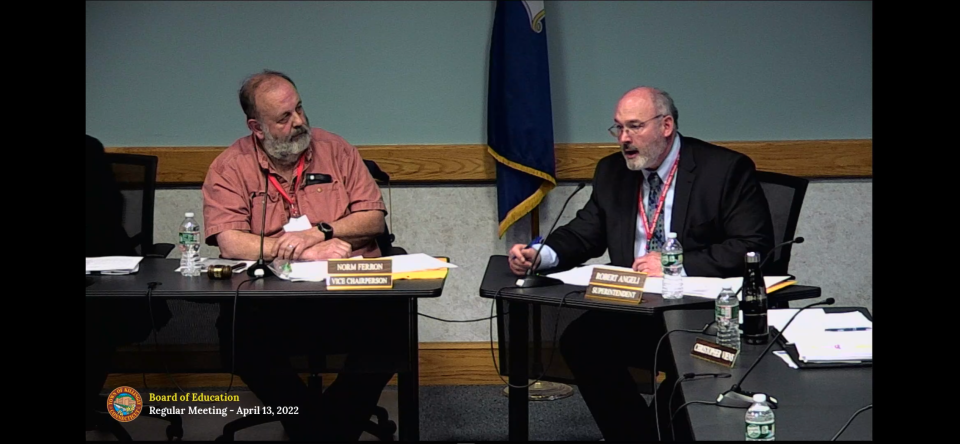Killingly mental health complaint investigation marked by flurry of legal arguments
The lawyer representing a group of citizens who filed a complaint against the Killingly school board says a “looming catastrophe” is on the horizon in the district unless student mental health issues are addressed.
In a May 16 letter to Attorney Michael McKeon, director of legal and governmental affairs for the state Department of Education, attorney Andrew Feinstein reiterated his argument that the board has “failed to meet the educational interests” laid out by the state after members rejected a school-based health center, or SBHC, at the high school and failed to offer practical alternatives.
The letter marks the latest skirmish in what has become a war of words between dueling interests fought by their respective attorneys – with each side hoping to convince state investigators of the merits of their arguments.

Six board members – Janice Joly (who’s since resigned), Norm Ferron, Jennifer Hegedus, Kyle Napierata and Jason Muscara, along with Democrat Lydia Rivera Abrams – on March 16 voted against a proposal to allow Generations Family Health Center Inc., to operate a school-based health center at Killingly High School at no cost to the district.
Feinstein’s letter was sent less than two weeks after the board defended its actions though a complaint response that argued members were well within their statutory rights to reject the proposal.
A deeper look: Resignations, complaints, and an investigation: Killingly school board's troubling year
In that response, the board, through its attorneys, said Feinstein's original April 5 complaint was a red herring.
“The complaint is not about the failure of a board of education to provide an integrated and comprehensive educational program designed to meet the needs of all students in a safe and nurturing learning environment,” the board’s Shipman & Goodwin LLP attorneys wrote. “Instead, it stems from a disagreement about a single decision of the Killingly Board of Education: whether or not the Board should provide space in its high school for Generations to provide private social work counseling services.”
Feinstein, who represents the "Concerned Residents/Parents of Killingly Students" group, countered that the availability of mental health services is the “crux” of complaint the state has deemed substantial enough to investigate.
CT jobs: Manufacturing companies struggle to fill jobs. What are they doing to entice workers?
“The Killingly Board of Education has, both through statements of members of the Board and through its inaction, promoted the view that public education is limited to academic matters and that public schools have no business delving into the personal lives of children,” Feinstein wrote.
Feinstein writes the state has a choice: To dismiss the complaint and accept the board’s “truncated” definition of the state’s education interests, or order the board to create a “comprehensive system” to address the social and emotional needs of students.
If the complaint is upheld, the state could order the Killingly board to undertake a remedial process aimed at rectifying the lack of compliance.
“Such a decision would not just impact Killingly, but would send word out throughout the state of what adequate public education requires,” Feinstein’s response states.
Burgers, shakes, and seafood: 102 years and a Food Network feature: How Harry's Place in Colchester keeps succeeding
After rejecting the school-based health center, board members proposed several “alternative” options, including hiring more staff and introducing peer mediation and anti-bullying programming. Feinstein characterized the hiring proposal as an impractical solution given the district’s limited budget and its lack of success in filling existing employee vacancies.
“This issue is not that the board failed to choose the best possible option,” Feinstein wrote, referring to the health center. “Rather, when faced with a demonstrable crisis in mental health for its students, the Board rejected a demonstrably workable solution for political reasons while going through a meaningless exercise of considering (alternatives).”
Christine Rosati Randall, a vocal proponent of the school-based health center plan, on Friday said the board has already submitted a rebuttal to Feinstein's own counter-response.
Jean Jacques murder trial: Norwich murder suspect 'adamant' police video was faked. He was talked out of testifying.
"And I expect (Feinstein) will in turn file a response to the board's newest letter," she said. "My hope is the state will make a decision on this sometime next month."
State Board of Education officials could not immediately be reached for comment on its investigative timeline.
The original proposal for the health center, forwarded by Superintendent Robert Angeli months ago, called for Generations to offer a range of free mental and behavioral health services to high school students. Proponents said such a service was crucial in addressing an uptick in mental health issues, including depression, suicidal ideation and anxiety, among students.
During a May 11 board meeting, several residents again urged the board to revisit its rejection decision. The board, by a majority vote, declined to allow public comment to extend past the allotted 20-minute limit on the SBHC topic. A motion to add a discussion and possible action item on the proposal to the night's agenda also failed to garner enough support.
John Penney can be reached at jpenney@norwichbulletin.com or at (860) 857-6965.
This article originally appeared on The Bulletin: Legal responses and counter-responses mark Killingly BOE investigation

